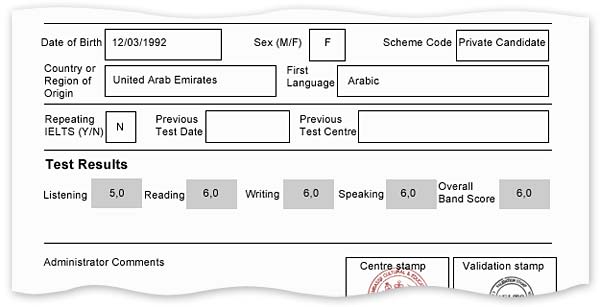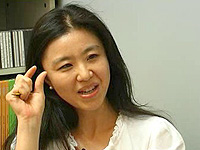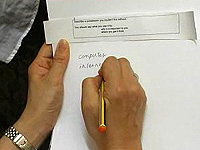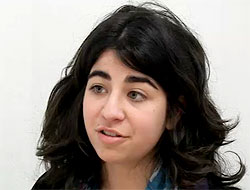
In this unit you will focus on the following:
- An overview of the IELTS speaking module
- The IELTS speaking module assessment criteria
- Speech functions tested in the speaking module
- Speaking test dos and don'ts
- Watching and analysing interviews
1. Check what you know: An overview.

Check what you know about the IELTS speaking test. Complete the text with the words below.
2. Assessment criteria.
TIP:
Candidates generally score lower in the speaking test than they do in the other tests. For this reason it is important to be prepared and not be anxious about taking the speaking test.
The IELTS speaking test is assessed using the following four criteria:
Fluency and coherence
Lexical resource
Grammatical range and accuracy
Pronunciation
What do these criteria mean exactly? Choose the correct option for each criterion.
3. Speaking band descriptors.
Assessors award a score for each of the four criteria (fluency and coherence, lexical resource, grammatical range and accuracy, and pronunciation) which are then averaged to provide a total score for speaking from 0 to 9.
Below there are four extracts from the IELTS speaking band descriptors (public version). They are all from band 6.
Read the descriptors and select the correct criterion for each descriptor.
TIP:
As you can see from exercise 3, you are not expected to speak without errors to achieve a grade 6.You can see the complete IELTS speaking band descriptors (public version) here.
4. Speech functions.

The speaking module tests your ability in a range of speech functions, including the following:
- providing personal information
- providing non-personal information
- expressing opinions
- justifying opinions
- suggesting
- explaining
- speculating
- expressing a preference
- comparing and contrasting
- summarising
- narrating
- paraphrasing (saying something in a shorter, more simple way)
- analysing
- conversation repair (rephrasing something that you have just said, that perhaps was not clear)
Listen to the following extracts and type the correct number next to the speech function.
5. Dictation.
Listen again to the candidate from exercise 4 and type what you hear to complete the extracts below. Listen as many times as necessary.
6. Dos and don'ts.

Decide if the following are dos (things you should do) or don'ts (things you shouldn't do) in the IELTS speaking test.
7. What the examiner says.
TIP:
All speaking tests are recorded. This is done to make sure evaluation is standardised and also for candidates who ask for their test to be reassessed.
During the test you will see the examiner taking notes. These notes are only about the timing of the three parts. They are not about your performance.
Read examples of what the examiner says in the three different parts of the speaking test. Which part is each extract from?
Part 1 – Introduction and interview: Introduction and general questions about familiar topics (four to five minutes).
Part 2 – Individual long turn: Candidate speaks about a given topic (three to four minutes).
Part 3 – Two-way discussion: Candidate and examiner discuss questions relating to the topic (four to five minutes).
8. The three parts of the speaking test.
Watch extracts from the three different parts of the speaking test. Which part is each extract from?
Part 1 – Introduction and interview: Introduction and general questions about familiar topics (four to five minutes).
Part 2 – Individual long turn: Candidate speaks about a given topic (three to four minutes).
Part 3 – Two-way discussion: Candidate and examiner discuss questions relating to the topic (four to five minutes).
9. What is happening?
Watch the extracts again and match the two parts to describe what is happening in each extract.
10. What do they say?
Use the phrases to complete three of the extracts. Then listen to check your answers.
11. What do they say?
Choose the best options to complete the last three extracts, then listen to check your answers.
TIP:
It's normal for candidates to make some mistakes when they are speaking. Usually these are minor and do not detract from the overall effect of what the candidate is saying. It's important to relax and focus on what you want to say, rather than worry too much about whether everything you say is correct or not.
Ana says:
... it was really good to have someone who you could talk about your studies.
instead of:
... it was really good to have someone who you could talk to about your studies.
Alex says:
... if there is something worth in it.
instead of:
... if there is something of worth in it, or ... if there is something of value in it, or
... if it's worth it.
12. Practice.

Practise answering these questions from the Part 1 task:
Your home
- Where do you live?
- What is your town or city like?
- Who do you live with?
- What type of building do you live in?
- How long have you lived there?
- What interesting things are there to see where you live?
Free time
- How much free time do you have?
- How do you spend your free time?
- Do you prefer to spend free time alone or with other people?
- Do you think that people have enough free time these days?
- What do you usually do at the weekend?
- What did you do last weekend?
Remember to:
- Give a short answer first and then elaborate on your answer.
- Correct yourself if you make a mistake.
- Overcome a vocabulary gap by expressing the idea in a different way.